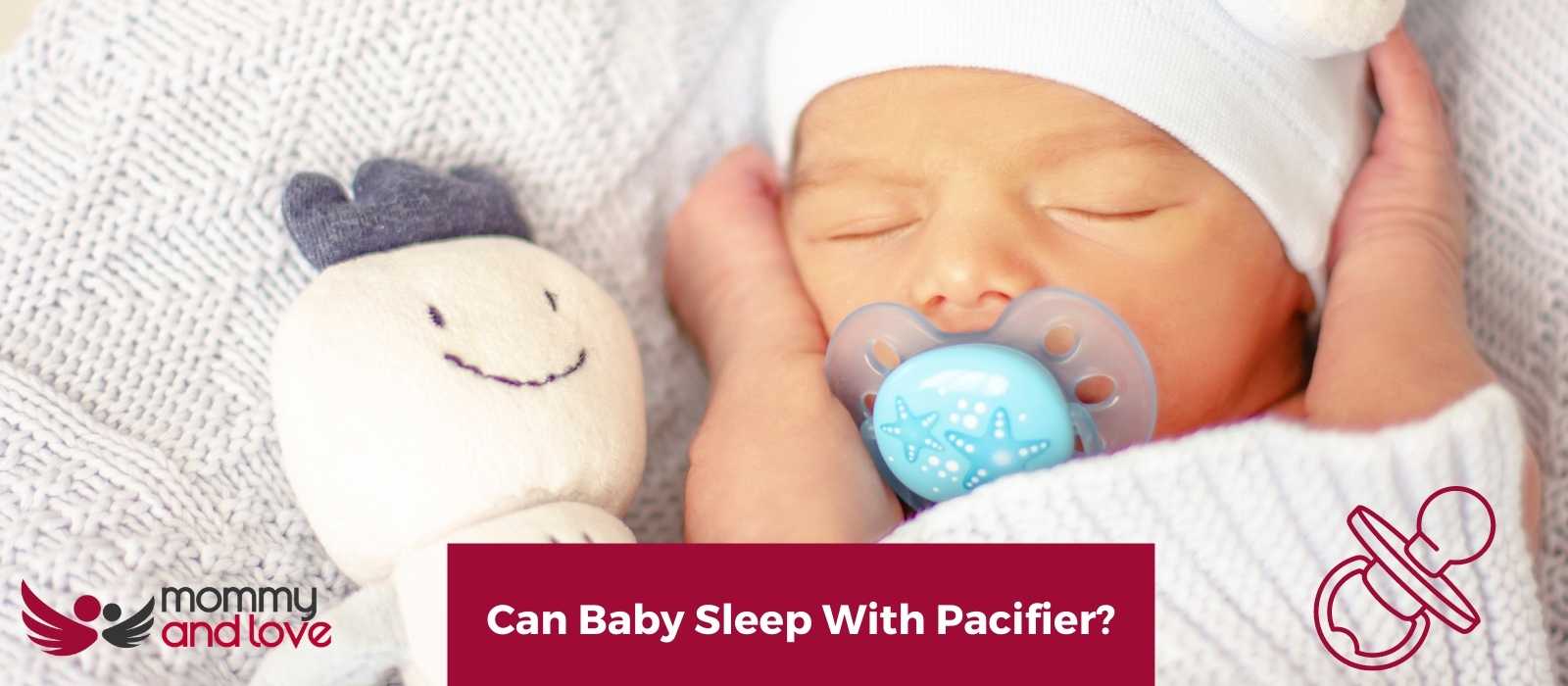There are a lot of myths surrounding pacifiers and whether or not babies should sleep with them. Some parents believe that pacifiers cause dental problems, while others think they help babies sleep better.
In this guide, we will debunk the myths about baby sleep and pacifiers and provide you with the facts.
If you’re wondering whether it’s okay for your baby to sleep with a pacifier, the short answer is yes! Introducing a pacifier to a newborn can actually help reduce the risk of sudden infant death syndrome or SIDS, and sucking on a pacifier can help babies fall asleep and stay asleep for longer periods of time.
Should You Leave the Pacifier in Your Baby’s Mouth While She Sleeps?
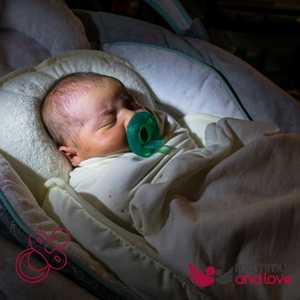
Pacifiers are a popular item for infants. They provide comfort and can help babies sleep. However, some parents worry that if their baby sleeps with a pacifier, they will not learn to sleep without one.
Thankfully, there is no evidence that suggests this is the case. In fact, many babies who sleep with a pacifier do not have any trouble sleeping without one when they are older.
There are several reasons why it is safe to give your baby a pacifier.
- Pacifiers can actually help reduce the risk of SIDS. Studies have shown that babies who use a pacifier are less likely to die from SIDS than those who do not.
- Pacifiers can help babies sleep through the night. Young children who use a pacifier are less likely to wake up during the night than those who do not.
- Pacifier use can help babies soothe themselves back to sleep if they do wake up during the night.
So while it’s safe for babies to sleep with a pacifier, parents should still follow the recommended safe sleep guidelines and pacifier usage by the American Academy of Pediatrics which say it is safe to give a pacifier after the age of one month and wean them from pacifier use after six months old.
What are the Benefits of Sleeping with a Pacifier?
Sleeping with a pacifier has a lot of benefits for both babies and parents. Here are some of them:
- reduce the risk of SIDS.
- keep your newborn baby teeth and mouth clean
- help your infant sleep more soundly
- helps calm babies when they’re particularly fussy
- encourages most babies to self-soothe
- provides pain relief in certain situations
Are Pacifiers Good for Babies?
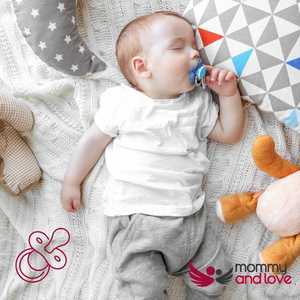
The short answer is yes! Infant pacifiers can have many benefits for both babies and their parents, but only from the ages of 1 month to 6 months old.
For babies, pacifiers can provide comfort and help them to self-soothe. This can be particularly helpful during times of stress or when they are trying to fall asleep. Pacifiers can also help to relieve pain from teething or other discomforts.
Pacifiers can also help to prevent babies from developing middle ear infections. This is because sucking on a pacifier can help to equalize the pressure in the middle ear, which can prevent fluid from building up and becoming infected.
For parents, pacifiers can be a godsend when trying to soothe a fussy child. They can also help the child to fall asleep and stay asleep for longer periods of time.
For preterm babies and premature babies, pacifiers are a good way for them to develop their sucking muscles for strong sucking reflex which are essential for proper breastfeeding.
Younger infants who were given pacifiers begin oral feeding sooner than those who don’t.
When Should You Introduce a Pacifier to Your Baby?
If you’re a new parent, you may be wondering when the best time is to introduce a pacifier to your little one the AAP recommend from one month old. This gives infants time to develop a strong suck reflex and helps them to latch on correctly.
If you’re breastfeeding, it’s best to wait until you and your baby are well established before introducing a pacifier. This helps to avoid any confusion or nipple confusion.
When to Stop Giving the Baby a Pacifier for Sleep?
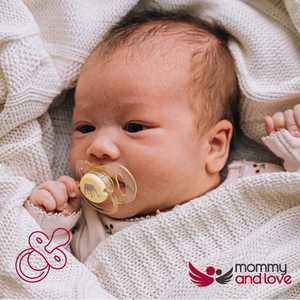
The simple answer is that you should start weaning your baby off the pacifier when they are around six months old. However, some parents choose to do it sooner or later than this.
There are a few things to consider when making your decision about when to wean your baby off the pacifier.
First, think about whether or not your baby is using the pacifier to soothe themselves to sleep, or if they are using it for other reasons, such as during feedings or when they are upset.
If your baby is using the pacifier to soothe themselves to sleep, then you may want to start weaning them off of it sooner, as it can be difficult to break the habit once it is established.
On the other hand, if your baby is using the pacifier for other reasons, such as during feedings or when they are upset, then you may want to wait a bit longer to start weaning them off of it. This is because the pacifier can help comfort your baby in these situations and may make the transition to sleeping without it easier.
Additionally, you should also limit pacifier use if your baby has developed a habit of finger sucking or non-nutritive sucking.
Are Pacifiers Bad to Babies’ Teeth?
Yes, pacifiers are harmful to children’s teeth. Pacifier use can cause a number of problems for teeth, including:
Tooth Decay
Never ever coat a pacifier with anything. If you do, the sweet substances and sugars in pacifiers coated with them can also promote the growth of bacteria that can lead to tooth decay.
Misalignment
Pacifier use can cause the teeth to become misaligned. This is because they put pressure on the teeth and change the way that the jaws close.
If pacifiers are used for extended periods, especially over the age of two then they can cause dental malocclusion. Dental malocclusion is when the teeth do not come together in the correct way. This can happen if the pacifier is used for a long period of time, as it can cause the teeth to grow in crooked or overlapping.
Speech Problems
Pacifiers can cause speech problems. This is because they can change the way that the tongue moves and how the teeth come together.
Do Pacifiers Interfere With Breastfeeding?
Yes, they can do if not introduced correctly and after breastfeeding has become established. If you introduce a pacifier before this, it can lead to nipple confusion. However if a pacifier is introduced after breastfeeding has become established, then the pacifier use does not interfere with breastfeeding. In fact, they can even offer some benefits to mothers and breastfed babies.
For example, pacifier use can help to soothe a fussy baby, which in turn can help the mother to relax and avoid feeling overwhelmed. Additionally, using a pacifier during those first few weeks can help to reduce the risk of Sudden Infant Death Syndrome (SIDS).
Of course, it is important to introduce one-piece pacifiers at the right time, especially when breastfeeding your child. If a baby is put to the breast too soon after birth, he or she may become confused and refuse to latch on properly.
It is best to wait until breast feeding with human milk and nursing routine is well established before introducing a pacifier. If your child has trouble latching, wait for a few weeks.
Orthodontic pacifiers are recommended by many dentists and doctors with backgrounds in pediatric dentistry for infants who have gotten used to breastfeeding. They can help babies’ teeth alignment if they are started using them at around 4 weeks old.
How Do Pacifiers Reduce the Risk of Sudden Infant Death Syndrome?
Sudden infant death syndrome (SIDS) is the leading cause of death in infants 1-year-old or younger. While the exact cause of SIDS is unknown, it is believed to be associated with several factors.
One of these factors is sleep position. Infants who sleep on their stomachs or sides are at a higher risk for SIDS than those who sleep on their backs.
Pacifiers have been shown to reduce the risk of SIDS in detailed research by the BMJ in every category of baby and social background (whether the child slept on back, side, front, if the mother smoked etc).
One theory is that the sucking reflex helps to keep the airway open. This is especially important when infants are sleeping on their stomachs or sides, as they are more likely to experience obstruction of the airway.
The BMJ concluded that ‘Use of a dummy seems to reduce the risk of SIDS and possibly reduces the influence of known risk factors in the sleep environment.‘
Another theory is that pacifiers help to stimulate the central nervous system and keep infants awake. This is important because SIDS is more likely to occur during sleep.
Can a Baby Choke on a Pacifier?
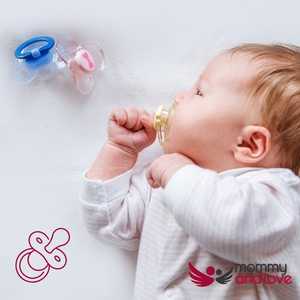
Yes. If a pacifier is allowed to get old and start breaking apart, the detached pieces can be a choking hazard.
It’s important to inspect pacifiers regularly and throw them away as soon as they start to show signs of wear and tear and buy different pacifiers.
Also, never attach the pacifier to your baby’s neck using strings.
If you think your child has swallowed a piece of a pacifier, call your doctor or go to the emergency room immediately. It’s better to be safe than sorry!
How to Wean a Baby off the Pacifier?
When it comes to weaning a baby off the pacifier, there is no one-size-fits-all answer. Some parents find that their baby takes to a cup or bottle more easily than others, while some babies wean themselves off the pacifier without going cold turkey.
To give you an idea, the American Academy of Family Physicians recommends limiting or stopping pacifier use when the baby’s age is 6 months in order to reduce the risk of ear infections.
However, there are a few general tips that may help make the process a little easier.
The first step is to cut back on the number of times your baby uses the pacifier each day. Let your baby practice without a pacifier.
If your baby is currently using it every hour, try cutting it back to every two hours. Once your baby is down to using the pacifier only a few times a day, you can start offering alternatives, such as a cup or bottle.
It’s important to be patient when weaning your baby off the pacifier. Some infants take longer than others to adjust, and it’s important not to force the issue. If your baby resists giving up the pacifier, try not to get frustrated – simply keep offering alternatives, and eventually, they will come around. Weaning your baby off pacifiers when he’s not ready can lead to more thumb sucking.
How Do Babies Get Ear Infections From Pacifiers?
Most children can get an increased risk of ear infections from pacifiers for a few reasons.
First, if a baby’s pacifier falls out of their own mouth and onto the floor, bacteria can transfer from the floor to the pacifier. If the baby then puts the pacifier back in their mouth, they can introduce bacteria into their ear canal. This is the primary reason why you should keep your baby’s pacifier clean at all times.
Second, if a baby drools while using a pacifier, the moisture can create an ideal environment for bacteria to grow.
Finally, if a baby takes a pacifier in and out of their mouth frequently, they can irritate the skin inside their ear canal, making it more susceptible to infection.
Take Away on Babies Sleeping with Pacifiers
Sleeping with a pacifier can help your baby sleep through the night. While it’s not always recommended to let your baby use a pacifier for an extended period of time, using one at bedtime can be helpful in getting them to sleep through the night.
If you’re struggling to get your little one to stay asleep, try using a pacifier and see if that makes a difference.
Baby Sleeping with Pacifiers FAQs
How to Create a Safe Infant Sleeping Environment?
The American Academy of Pediatrics (AAP) offers these tips for creating a safe sleep environment for your infant to prevent sleep-related infant deaths:
- Place the baby on his or her back on a firm sleep surface, such as a crib mattress, covered by a fitted sheet.
- Soft objects, toys, stuffed animals, loose bedding, pillows, comforters, quilts, sheepskins, and other items that could increase the risk of suffocation, entrapment, or strangulation should be removed from the baby sleep area.
- Keep the baby’s sleeping area in the same room where you sleep, so you can easily monitor your infant.
- Consider using a fan in the room to circulate air and keep the room cool, but make sure the fan isn’t pointed directly at the baby.
- Make sure the cord from any window blinds or shades is out of reach of the baby, and never place a baby’s crib near a window.
- Don’t smoke during pregnancy, and don’t allow anyone to smoke around your infant. Secondhand smoke is a child health hazard.
- Keep the baby away from all types of secondhand smoke, including tobacco, marijuana, and vaping products.
- Don’t use alcohol or drugs while caring for your baby. They can make you less alert and more likely to fall asleep while caring for your infant.
For additional up-to-date safety tips or if you have any particular concerns, you can always talk to an infant sleep consult or a professional with a background in behavioral sleep medicine.

This article was written by: Gian MIller – Full-Time Writer, Baby Whisperer & Dad of 3.
Gian spends a lot of his time writing. A self-proclaimed baby whisperer, Gian has been through it all with his own children and is passionate about sharing his hard-won wisdom with other parents. When he’s not writing or changing diapers, you can find him playing the guitar or watching baseball (or preferably both at the same time).

